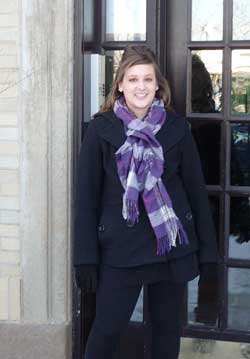
Most 20-year-olds can’t picture owning a home for at least another several years. For them, Kristen Conradi has a bit of advice: “Dude,” she says, “don’t rent.”
In December Conradi, a 20-year-old college student, bought a foreclosed two-bedroom condo near Northeastern Illinois University, where she will be transferring in the fall. Her total monthly payment on the condo is $722—about half the cost of renting a two-bedroom apartment in the neighborhood. And after graduation, Conradi will have an asset that she ought to have no problem selling or renting at a competitive advantage to students from Northeastern and North Park University, which are both only a few blocks from the condo.
Conradi (who is the niece of Tom Conradi, the advertising director at Chicago) says that she had no plans to buy a condo until her mother, a real-estate appraiser, suggested she check out foreclosures along with apartments while preparing for her imminent switch to Northeastern from the two-year College of Lake County. Working with an agent, Violet Jaworska of Dream Town, she found ten foreclosures in approximately the area she wanted, all in the price range of $50,000 to $100,000. The one she ultimately bought “blew all the others out of the water,” she says. While other condos were missing appliances or had trashed bathrooms and windows, this one had everything intact and in good shape. It’s a two-bedroom condo with about 1,000 square feet of space on a quiet street with parks, a bike path, and a footbridge over the North Branch of the Chicago River nearby.
The foreclosed owner had paid $219,500 for the condo in 2006, when the vintage building was rehabbed and converted from rentals to condos. Conradi got it for $75,000. Her monthly mortgage payment is $341, but with assessments and property taxes, her total monthly outlay is $722. She will get the $8,000 income tax credit available to first-time homebuyers—which is more than the $7,500 needed for a down payment of 10 percent on Conradi’s condo. (Conradi paid the down payment from her own savings, but she declined to say how much money she put down.)
Conradi hadn’t known about the tax credit until her mother and her mortgage broker, Tracy Flanagan of Wintrust, brought it up. “I’m going to save so much money by the time I’m 25, I’m like ecstatic,” Conradi says. “It doesn’t make sense to rent if you can do this.”
Conradi says she understood that, as a college student with a part-time job and a limited credit record, she was not a shoo-in for a mortgage. But Flanagan found a loan program that would work for her. “Everybody really wanted to help me make this work,” she says. And Conradi kept looking for bargains: After her attorney, Ziggy Kois, negotiated a $5,600 credit from the seller, LaSalle Bank, for tuck pointing the building’s exterior, she nudged him to give her a discount price for his services.
At the closing, Violet Jaworska, Conradi’s real estate agent, gave her a bottle of champagne, a customary gift from real-estate agents. Trouble is, Conradi’s not yet of legal age to drink it.


